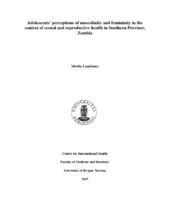| dc.contributor.author | Lundamo, Mwila | en_US |
| dc.date.accessioned | 2017-07-31T12:08:02Z | |
| dc.date.available | 2017-07-31T12:08:02Z | |
| dc.date.issued | 2017-06-28 | |
| dc.date.submitted | 2017-06-27T22:00:04Z | |
| dc.identifier.uri | https://hdl.handle.net/1956/16154 | |
| dc.description.abstract | Adolescence is a very critical period in which gender norms develop for young people and are carried into adulthood. The gender norms of how adolescents construe themselves as fitting the masculine ideal for boys or the feminine ideal for girls have implications for their sexual and reproductive health. Among these norms are norms promoting unequal access to resources that weaken girls’ negotiation in sexual issues. This inequality is associated with adolescent pregnancies and poor reproductive health outcomes. Pregnancy in adolescence is associated with health complications and also adverse socio-economic outcomes. Aim: The aim of this study was to generate knowledge on adolescents’ perceptions of gender differences, gender relations, and empowerment of girls in relation to sexual and reproductive health in the CISMAC RISE project. Methods: A qualitative study employing participant observation, in-depth interviews, and focus group discussions was conducted in Southern province of Zambia. Secondary data collected from the same setting was also analyzed. 14 in depth interviews were conducted and 6 focus group discussions as primary data. 2 in depth interviews and 3 focus group discussions from a similar study were included for secondary analysis. Findings: The findings demonstrate that there are multiple, sometimes contradictory and ambiguous ways of demonstrating masculinity and femininity. Findings show that there are exists some liberalism for boys to engage in sexual activity to demonstrate manliness, even though it is contested. Girls’ sexuality is censured and is framed in terms of economic and material exchange due to the structural underprivileged position of girls. Empowerment of girls is seen as a form of protecting girls from the economic pressure that make them succumb to relationships and sex. However, empowerment of girls is resisted and seen as an attack on traditional masculinity. | en_US |
| dc.language.iso | eng | eng |
| dc.publisher | The University of Bergen | eng |
| dc.subject | adolescent | eng |
| dc.subject | gender norms | eng |
| dc.subject | inequality | eng |
| dc.subject | Pregnancy | eng |
| dc.subject.mesh | Adolescent | eng |
| dc.subject.mesh | Socioeconomic Factors | eng |
| dc.subject.mesh | Pregnancy | eng |
| dc.title | Adolescents' perceptions of masculinity and femininity in the context of sexual and reproductive health in Southern Province, Zambia | en_US |
| dc.type | Master thesis | |
| dc.date.updated | 2017-06-27T22:00:04Z | |
| dc.rights.holder | Copyright the Author. All rights reserved | |
| dc.description.degree | M.Phil. in International Health - Thesis | |
| dc.description.localcode | MAMD-INTH | |
| dc.description.localcode | INTH395 | |
| dc.subject.nus | 769913 | eng |
| dc.subject.nsi | VDP::Medisinske Fag: 700::Helsefag: 800::Samfunnsmedisin, sosialmedisin: 801 | en_US |
| fs.subjectcode | INTH395 | |
| fs.unitcode | 13-26-00 | |
